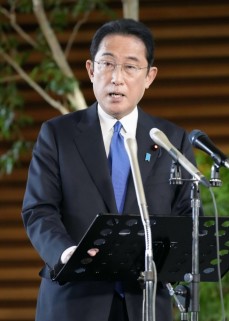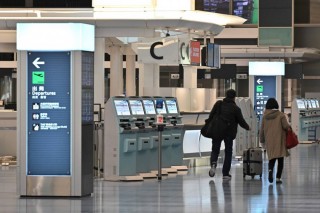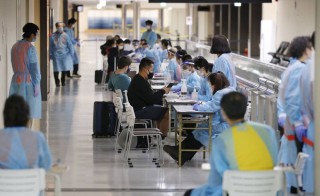Loading
Search
▼ Japan Quickly Reverses Course On Halt Of New Reservations For Inbound Flights
- Category:Tourism
Less than 24 hours after it was announced, Japan retracted its request for airlines to halt inbound flight bookings Thursday in a rapid reversal of a move that had roiled Japan's citizens and residents abroad and even caught Prime Minister Fumio Kishida and his transport minister off guard.
“The request was made as an emergency measure to prevent (the spread of the omicron coronavirus variant), but it caused confusion among" people affected by the decision, Chief Cabinet Secretary Hirokazu Matsuno said during a news conference.
To make it possible for Japanese nationals to return home, “the transport ministry has withdrawn the request to suspend new reservations of flights to Japan and will give close attention to demand among Japanese" who are currently overseas.
A transport ministry official said the ministry will coordinate with airlines to avoid a concentration of bookings on specific days or during certain time periods, hinting that they may restrict reservations on busy travel days, such as weekends.
The official said the passenger restriction policy is not intended to give priority to Japanese nationals and said that foreign residents of Japan can make reservations to re-enter the country.
“The request was made as an emergency measure to prevent (the spread of the omicron coronavirus variant), but it caused confusion among" people affected by the decision, Chief Cabinet Secretary Hirokazu Matsuno said during a news conference.
To make it possible for Japanese nationals to return home, “the transport ministry has withdrawn the request to suspend new reservations of flights to Japan and will give close attention to demand among Japanese" who are currently overseas.
A transport ministry official said the ministry will coordinate with airlines to avoid a concentration of bookings on specific days or during certain time periods, hinting that they may restrict reservations on busy travel days, such as weekends.
The official said the passenger restriction policy is not intended to give priority to Japanese nationals and said that foreign residents of Japan can make reservations to re-enter the country.
Matsuno said that returning foreign residents should be given the same level of consideration for re-entry as Japanese nationals.
The government has been also allowing non-resident foreign nationals to enter the country for humanitarian reasons and under “special exceptional circumstances,” including spouses and children of Japanese.
Matsuno, however, said the government will manage the rules covering exceptional cases more strictly. It accepted about 350 travelers under such circumstances daily in October.
The abrupt withdrawal of the request came after the government announced Wednesday that it had asked airlines to stop taking bookings for inbound flights in December, which startled citizens and foreign nationals, particularly those planning to fly during the New Year's holiday period.
Japan Airlines Co. and All Nippon Airways Co. had reportedly complied with the request, which would have disrupted the travel plans for many citizens and foreign residents.
The move came as a surprise to not only the general public but also some government officials, as the transport ministry’s civil aviation bureau hastily made the decision without consulting transport minister Tetsuo Saito and other related officials.
“This is a case that significantly affects people, so I’ve told the aviation bureau to handle it in a more careful and thorough manner,” Saito said.
Saito said the bureau sent out the request to airlines on Monday but the minister, Matsuno and Kishida first heard of it Wednesday.
The government has been also allowing non-resident foreign nationals to enter the country for humanitarian reasons and under “special exceptional circumstances,” including spouses and children of Japanese.
Matsuno, however, said the government will manage the rules covering exceptional cases more strictly. It accepted about 350 travelers under such circumstances daily in October.
The abrupt withdrawal of the request came after the government announced Wednesday that it had asked airlines to stop taking bookings for inbound flights in December, which startled citizens and foreign nationals, particularly those planning to fly during the New Year's holiday period.
Japan Airlines Co. and All Nippon Airways Co. had reportedly complied with the request, which would have disrupted the travel plans for many citizens and foreign residents.
The move came as a surprise to not only the general public but also some government officials, as the transport ministry’s civil aviation bureau hastily made the decision without consulting transport minister Tetsuo Saito and other related officials.
“This is a case that significantly affects people, so I’ve told the aviation bureau to handle it in a more careful and thorough manner,” Saito said.
Saito said the bureau sent out the request to airlines on Monday but the minister, Matsuno and Kishida first heard of it Wednesday.
“I am sorry that the aviation bureau made a bit of a rough move.”
Saito said the ministry will work with airlines to monitor passenger demand this month while keeping in place the daily cap of 3,500 inbound travelers.
Kishida's administration has been implementing measures to guard against the new omicron strain, which many scientists believe may be more transmissible than other variants.
Kishida announced on Monday that Japan would reimpose entry restrictions for new foreign arrivals starting Tuesday. The government further tightened its border controls Wednesday to also cover returning foreign residents from South Africa and nine other countries: Angola, Botswana, Eswatini (formerly known as Swaziland), Lesotho, Malawi, Mozambique, Zambia, Zimbabwe, Namibia.
Still, Japan confirmed its first omicron case on Tuesday in a male diplomat in his 30s who was traveling from Namibia. The second case was reported on Wednesday in a man in his 20s who had stayed in Peru.
Japan’s measures have been criticized as being too strict and for being discriminatory against foreign nationals.
The World Health Organization has urged countries not to impose blanket travel bans, saying they are ineffective in preventing the coronavirus from spreading and place a heavy burden on people's lives.
"Epidemiologically, I find it hard to understand the principle there. Does the virus read your passport?
Does the virus know your nationality or where you are legally resident?"
Michael Ryan, head of the WHO's Health Emergencies Program, said at a news conference Wednesday when asked about Japan's ban on new entries of foreign nationals.
While fears about the omicron variant grow, vaccine-makers are researching the new strain and developing vaccines in the event that the variant is found to be adept at bypassing the existing jabs.
Mikael Dolsten, Pifzer Inc.’s chief scientific officer said in an interview with TV Tokyo aired on Thursday that the firm will be able to provide a vaccine effective against omicron in late March if approval is granted swiftly.
Saito said the ministry will work with airlines to monitor passenger demand this month while keeping in place the daily cap of 3,500 inbound travelers.
Kishida's administration has been implementing measures to guard against the new omicron strain, which many scientists believe may be more transmissible than other variants.
Kishida announced on Monday that Japan would reimpose entry restrictions for new foreign arrivals starting Tuesday. The government further tightened its border controls Wednesday to also cover returning foreign residents from South Africa and nine other countries: Angola, Botswana, Eswatini (formerly known as Swaziland), Lesotho, Malawi, Mozambique, Zambia, Zimbabwe, Namibia.
Still, Japan confirmed its first omicron case on Tuesday in a male diplomat in his 30s who was traveling from Namibia. The second case was reported on Wednesday in a man in his 20s who had stayed in Peru.
Japan’s measures have been criticized as being too strict and for being discriminatory against foreign nationals.
The World Health Organization has urged countries not to impose blanket travel bans, saying they are ineffective in preventing the coronavirus from spreading and place a heavy burden on people's lives.
"Epidemiologically, I find it hard to understand the principle there. Does the virus read your passport?
Does the virus know your nationality or where you are legally resident?"
Michael Ryan, head of the WHO's Health Emergencies Program, said at a news conference Wednesday when asked about Japan's ban on new entries of foreign nationals.
While fears about the omicron variant grow, vaccine-makers are researching the new strain and developing vaccines in the event that the variant is found to be adept at bypassing the existing jabs.
Mikael Dolsten, Pifzer Inc.’s chief scientific officer said in an interview with TV Tokyo aired on Thursday that the firm will be able to provide a vaccine effective against omicron in late March if approval is granted swiftly.
- December 2, 2021
- Comment (0)
- Trackback(0)




